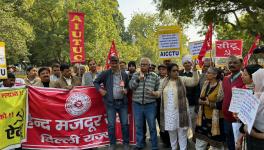TN: State Should Course-correct Anti-Worker Labour Codes, Says CITU

Representational Image.
The Union government compressed 29 Labour Codes and made them into four codes, but the rules for its implementation are to be carried out by each of the state governments. The Centre for Indian Trade Unions (CITU) in Tamil Nadu has urged the Dravida Munnetra Kazhagam (DMK) government to take a worker-friendly approach even though the Bharatiya Janata Party (BJP) led Union government has passed these anti-worker codes.
“90% of workers have been removed from the benefits of the labour Acts by these labour codes. The state government must make rules to ensure that it corrects these codes,” said A Soundararajan, Tamil Nadu general secretary of the CITU.
The rules for three labour codes were drafted by the Labour Welfare And Skill Development Department of the Tamil Nadu government and circulated for responses and suggestions on April 11. The drafts on Wages (Tamil Nadu) Rules, 2022, Industrial Relations (Tamil Nadu) Rules, 2022, and Occupational Safety, Health and Working Conditions (Tamil Nadu) Rules, 2022 are in circulation.
These are not available in Tamil; the CITU has demanded they be made available in Tamil to reach a larger section of the population and receive more responses.
The CITU in Tamil Nadu has submitted 51 suggestions, or objections, to the draft rules, stating that this is the only way some justice can be met.
Notably, CITU outrightly opposed the shrinking of the number of codes into four, stating that it was anti-worker in nature and demanded the repeal of the same.
‘INCLUDE PARENTS IN FAMILY’
The minimum wages are calculated based on the requirements of a standard working-class family unit and their geographical location. As per the draft Code on Wages Rules, the family includes a spouse and two children apart from the earning worker, an equivalent of three adult consumption units.
This includes a net intake of 2,700 calories/day per consumption unit and 66 metres of cloth/year/standard working-class family. The housing rent expenditure constitutes 10% of food and clothing expenditure; fuel, electricity and other miscellaneous items of expenditure constitute 20% of the minimum wages, and expenditure for children’s education, medical requirement, recreation, and contingencies constitute 25% of the minimum wages.
The CITU has demanded the inclusion of the parents of the earning member or their spouse (two units) and each child as a separate unit (two units), which makes six units/family, as opposed to the proposed three units.
The state government’s draft read that once the minimum daily wage is fixed, it shall be divided by eight for fixing the rate of wages for an hour and multiplied by 26 for fixing the rate of wages for a month.
RULES FOR THE CHANGING TIMES
The draft of the rules read that while fixing the minimum rate of wages, “the Government shall divide the concerned geographical area into three categories, namely, metropolitan area, non-metropolitan area and the rural area.”
The CITU has objected to this three-way division of the state and has stressed that rural areas will fall under non-metropolitan areas; thereby, the rural area category should be scrapped.
Soundararajan said, “Only then will the minimum wages be applicable to a large section of the population. Rural workers would otherwise be left out. That is a grave injustice.”
With increased urbanisation and concentration of people in certain regions, the house rent expenditure is high and constitutes a large portion of the income. The CITU has suggested expanding the housing rent expenditure from 10% of food and clothing to 20%.
CITU has suggested that another expenditure be added while calculating minimum wages, that of expenses to use mobile phones.
“A new expenditure that was not there for workers in the past is the expenses to use mobile phones. When even children have to take up online education, owning mobile phones or tablets has become a necessity. The cost comes up to as much as Rs 1,000/family. That expense has to be added to the minimum wages,” said Soundararajan.
‘EMPOWER TRADE UNIONS’
CITU has reiterated that the workers’ representatives to the respective committees must be selected upon discussion with the trade unions.
Regarding trade union registrations Soundararajan said, “Earlier the registration of trade unions was being delayed, after some struggle, it was ensured that within 45 days a union must be registered. We now demand that if a union is not registered within 45 days of application, it should be deemed to be registered.”
Only after the permission of a woman worker or the trade union should she be allotted night shifts, suggested CITU. It reiterated that there should at least be 10 women working at that time.
CITU has opposed the norm that the owners decide the Verification Officers. It suggested that the labour department fix these officers, and the officials in the department should do the verifications.
The CITU suggested that there should be a Protection Officer for every 500 employees instead of the proposed 5000 employees.
The CITU put together these suggestions and submitted them to the Labour Secretary, Labour Commissioner, and Director of Industries, Health and Safety.
Soundararajan said, “The four new codes ensured that the state could not draft rules for many provisions. As per the Constitution, the Centre does not have the right to do this because labour is in the concurrent list.”
Get the latest reports & analysis with people's perspective on Protests, movements & deep analytical videos, discussions of the current affairs in your Telegram app. Subscribe to NewsClick's Telegram channel & get Real-Time updates on stories, as they get published on our website.
























